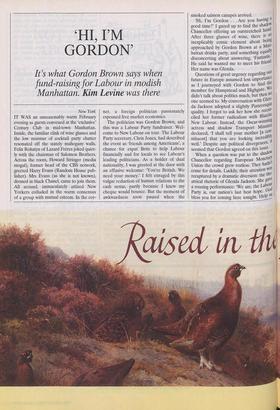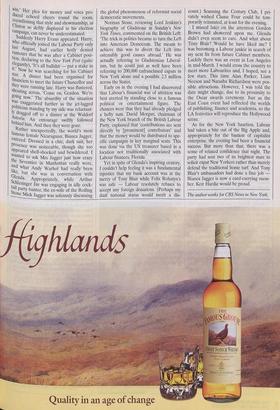`HI, I'M GORDON'
It's what Gordon Brown says when fund-raising for Labour in modish
New York IT WAS an unseasonably warm February evening as guests convened at the 'exclusive' Century Club in mid-town Manhattan. Inside, the familiar clink of wine glasses and the low murmur of cocktail party chatter resonated off the stately mahogany walls. Felix Rohatyn of I n7Ard Freres joked quiet- ly with the chairman of Salomon Brothers. Across the room, Howard Stringer (media mogul), former head of the CBS network, greeted Harry Evans (Random House pub- lisher). Mrs Evans (as she is not known), dressed in black Chanel, came to join them. All around, immaculately attired New Yorkers colluded in the warm consensus of a group with mutual esteem. In the cor- ner, a foreign politician passionately espoused free market economics.
The politician was Gordon Brown, and this was a Labour Party fundraiser. Wel- come to New Labour on tour. The Labour Party secretary, Chris Jones, had described the event as 'friends among Americans', a chance for expat Brits to help Labour financially and for locals to see Labour's leading politicians. As a holder of dual nationality, I was greeted at the door with an effusive welcome: 'You're British. We need your money.' I felt enraged by this vulgar reduction of human relations to the cash nexus, partly because I knew my cheque would bounce. But the moment of awkwardness soon passed when the smoked salmon canapes arrived. `Hi, I'm Gordon . . . Are you having a good time?' I gazed up to find the shadow Chancellor offering an outstretched hand. After three glasses of wine, there is an inexplicably comic element about being approached by Gordon Brown at a Man- hattan drinks party, and something ecluallY, disconcerting about answering, `Fantastic. He said he wanted me to meet his friend. Her name was Glenda. Questions of great urgency regarding our future in Europe assumed less importance as I journeyed with Gordon to find the member for Hampstead and Highgate. We didn't talk about politics much, but then no one seemed to. My conversation with Glen- da Jackson adopted a slightly Pinteresque quality. I forgot to ask her how she recon- ciled her former radicalism with Blairite New Labour. Instead, the Oscar-winning actress and shadow Transport Minister declared, 'I shall tell your mother [a con- stituent] that you are looking incredibly well.' Despite any political divergences, it seemed that Gordon agreed on this issue. When a question was put to the shadow Chancellor regarding European Monetary Union the crowd grew restless. They hadn't come for details. Luckily, their attention was recaptured by a dramatic diversion: the the- atrical rhetoric of Glenda Jackson. She gave a rousing performance: 'We are, the Labour Party is, our nation's last best hope. God bless you for coming here tonight. HelP t15 win. Her plea for money and votes pro- duced echoed cheers round the room, reconfirming that style and showmanship, as Clinton so deftly displayed in his election campaign, can never be underestimated. Suddenly Harry Evans appeared. Harry, who officially joined the Labour Party only last August, had earlier hotly denied rumours that he was after a Cabinet posi- tion, declaring to the New York Post (quite e. legantly), 'It's all bullshit — put a stake in it.' Now he was searching for his Cabinet star. A dinner had been organised for financiers to meet the future Chancellor and they were running late. Harry was flustered, shouting across, 'Come on, Gordon. We're going now.' The absurdity of the situation was exaggerated further as the jet-lagged politician standing by my side was reluctant- ly dragged off to a dinner at the Waldorf Astoria. An entourage swiftly followed behind him. And then they were gone. Rather unexpectedly, the world's most famous female Nicaraguan, Bianca Jagger, entered. Dressed in a chic, dark suit, her presence was noticeable, though she too appeared shell-shocked and bewildered. I wanted to ask Mrs Jagger just how crazy the Seventies in Manhattan really were, and what Andy Warhol had really been like, but she was in conversation with Glenda. Appropriately, while Arthur Schlesinger Jnr was engaging in idle cock- tail party banter, the ex-wife of the Rolling Stone Mick Jagger was solemnly discussing the global phenomenon of reformist social democratic movements.
Norman Stone, reviewing Lord Jenkins's biography of Gladstone in Sunday's New York Times, commented on the British Left: `The trick in politics became to turn the Left into American Democrats. The means to achieve this was to divert the Left into ostensibly good causes abroad.' He was actually referring to Gladstonian Liberal- ism, but he could just as well have been referring to 200,000 enfranchised expats in New York alone and a possible 2.5 million across the States.
Early on in the evening I had discovered that Labour's financial war of attrition was best averted by standing close to a famous political or entertainment figure. The chances were that they had already pledged a hefty sum. David Morgan, chairman of the New York branch of the British Labour Party, explained that 'contributions are sent directly by [prominent] contributors' and that the money would be distributed to spe- cific campaigns in key marginal seats. This was done via the US treasurer based in a location not traditionally associated with Labour finances, Florida.
Yet in spite of Glenda's inspiring oratory, I couldn't help feeling it was a fundamental injustice that my bank account was at the mercy of Tony Blair while Felix Rohatyn's was safe — Labour resolutely refuses to accept any foreign donations. (Perhaps my dual national status would merit a dis- count.) Scanning the Century Club, I pri- vately wished Clause Four could be tem- porarily reinstated, at least for the evening.
I mused later on the attention Gordon Brown had showered upon me. Glenda didn't even seem to care. And what about Tony Blair? Would he have liked me? I was becoming a Labour junkie in search of my next fix from future Cabinet members. Luckily there was an event in Los Angeles in mid-March. I would cross the country to meet more Labourites and, I hoped, see a few stars. This time Alan Parker, Liam Neeson and Natasha Richardson were pos- sible attractions. However, I was told the date might change, due to its proximity to the Oscar awards ceremony. Just as the East Coast event had reflected the worlds of publishing, finance and academia, so the LA festivities will reproduce the Hollywood scene.
As for the New York function, Labour had taken a bite out of the Big Apple and, appropriately for the bastion of capitalist enterprise, the evening had been a financial success. But more than that, there was a sense of relaxed confidence that night. The party had sent two of its brightest stars to solicit expat New Yorkers rather than merely defend the traditional home turf. And Tony Blair's ambassadors had done a fine job Bianca Jagger is now a card-carrying mem- ber. Keir Hardie would be proud.



























































 Previous page
Previous page